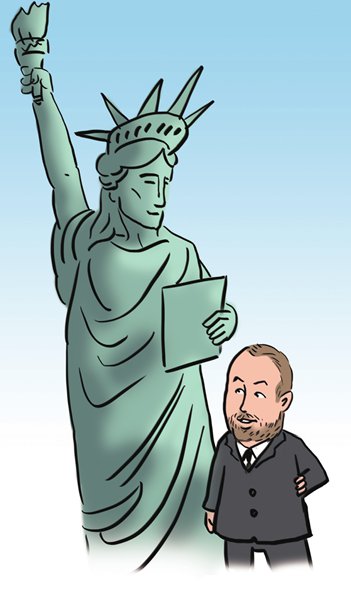
Illustration: Liu Rui/GT
On January 3, the New York City Council elected a new speaker who will hold the reins for the next four years. When it was announced that 35-year-old Corey Johnson won 48 votes from the 49 council members who voted and, therefore, became the second-most powerful elected official in the city after the Mayor, he received a standing ovation.
The journey to reach here was not an easy one for Johnson, not only because there were, at some stage, as many as eight candidates running for the position, but also because of his unusual background. He is an openly gay, HIV positive, former suicidal drug addict, and has no college education. His biological father was born of a Korean woman and an American soldier stationed in South Korea. He grew up with his mother and stepfather.
When Johnson, the then co-captain of the American football team at his high school, came out as gay, his story was featured by some major media outlets including The New York Times in 2000. On the day of the election, a black council member from the Bronx, Ritchie Torres, said in his supporting speech that he first saw Johnson's name in the media when he was 12. The story inspired him. And he never thought they'd be sitting together at the council chamber today.
Watching all this unfold from the audience seat, I couldn't help repeat in my mind the signature line the legendary New York Post gossip columnist Cindy Adams uses to end her columns - "Only in New York, kids, only in New York."
To many people living in New York, Johnson's election may not be any surprise at all. The city council, after all, has never ceased setting historic records in recent years when it comes to the speaker's election. Johnson's predecessor, Melissa Mark-Viverito, a Latina born in Puerto Rico whose term ended last year, was the first speaker from a minority community. Her predecessor Christine Quinn was the first openly lesbian speaker. And Quinn's predecessor Gifford Miller was only 32 when he was elected, the youngest ever.
To some, Johnson's election may not even be anything to celebrate about. In this deeply Democratic city, the liberal to extremely liberal council speakers have been choreographing, most of the time, with the liberal to extremely liberal mayors. They produce policies that some people may deem too costly, and too radical.
This is a city where tenants get much more protection than landlords. All students get free lunches at school to protect children from low-income families from being identified as poor. And city agencies are mandated to translate their documents into 10 languages. Who knows what's next in the minds of the newly elected extremely liberal speaker and the re-elected extremely liberal Mayor Bill de Blasio.
But this is also a time when President Donald Trump has set a new low in terms of public attacks, and shaming and bullying of those who are not considered part of "us." Hate crime cases have been rising in both the nation and this city. And the tightening immigration policies have left international students worried about job opportunities, and undocumented immigrants live in fear.
Johnson's victory and the New York values it reflects are more significant now than ever.
From last year through now, while the Trump administration has been directing federal law enforcement officers to arrest and deport more undocumented immigrants, New York has been holding the torch of its "sanctuary city" status even higher. It has been providing free lawyers to immigrants facing deportation. It has banned city employees, police included, from asking a person's immigration status. And it refuses to facilitate federal law enforcement if officers want to arrest those who may be deported. It does so despite a threat from the federal government to reduce the city's funding.
According to a story in The New York Times, after Johnson came out, a lineman of an opposing school team shouted gay slurs at him. "I couldn't stop laughing," Johnson told the Times. "Here, I had come out to my teachers, my parents and my team, and this guy thought he could intimidate me?"
To those who are vulnerable in the intolerant atmosphere in the US, New York City may have provided the same kind of assurance as Johnson felt back then. If this city is determined to protect you, no one and nothing can intimidate you.


